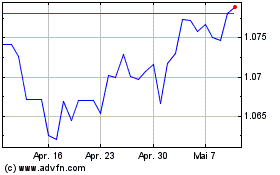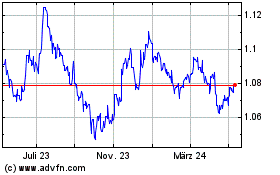Euro Advances After ECB Coeure's Comments
28 Oktober 2016 - 8:08AM
RTTF2
The euro climbed against its major counterparts in early
European trading on Friday, after the European Central Bank policy
maker Benoit Coeure said that the bank is determined to provide
monetary support until inflation rises, but keeping interest rates
lower for a prolonged period of time could pose risk to financial
stability.
Although the bottom of rates is below the central bank's minus
0.4 percent deposit rate, there exists an economic lower bound
where the negative impact on monetary policy transmission through
banks outweigh the positive aspects, Coeure told at the 4th
Frankfurt Conference on Financial Market Policy "Challenged by low
interest rates" in Frankfurt, Germany.
Coeure urged the governments to carry out structural reforms to
take more share of the burden of macroeconomic stabilisation by
supporting investment and achieving a growth friendlier
composition.
"Procrastination and forbearance have not served the euro area
well... If our banks had been cleaned up and strengthened early
after the crisis, our growth path would today be higher," he
added.
Survey data from the European Commission showed that Eurozone
economic confidence rose to a 10-month high in October.
The economic sentiment index rose more-than-expected to 106.3 in
October from 104.9 in September. This was the highest since
December 2015, when the reading was 106.6. The expected reading was
104.9.
The currency showed mixed trading in the Asian session. While
the euro held steady against the greenback, Swiss franc and the
pound, it rose against the Japanese yen.
The euro reversed from an early low of 1.0821 against the Swiss
franc, edging higher to a 3-day high of 1.0851. The next possible
resistance for the euro-franc pair is seen around the 1.10
zone.
Survey results from the KOF Swiss Economic Institute showed that
its leading index for a second straight month in October to its
highest level since the start of 2014.
The KOF economic barometer climbed to 104.7 from 101.6 in
September, which was revised from 101.3. Economists had forecast a
reading of 101.8.
The euro edged up to 1.0925 against the greenback, from
Thursday's closing value of 1.0893. Continuation of the euro's
uptrend may see it challenging resistance around the 1.12 area.
The euro strengthened to an 8-day high of 0.8994 against the
pound, compared to 0.8951 hit late New York Thursday. On the
upside, 0.92 is possibly seen as the next resistance level for the
euro.
The euro that closed yesterday's trading at 114.69 against the
Japanese yen climbed to a 2-week high of 115.04. The euro is seen
finding resistance around the 117.00 zone.
The euro advanced to a new 2-week high of 1.4635 against the
loonie and a 11-day high of 1.4434 against the the aussie in early
European deals and was steady shortly thereafter. If the euro
extends rise, 1.465 and 1.46 are likely seen as its next resistance
levels against the loonie and the aussie, respectively.
The euro that climbed to 1.5332 against the kiwi at 3:15 am ET
held steady in a short while. The pair was valued at 1.5296 when it
closed Thursday's trading.
Looking ahead, Germany's flash consumer price data for October,
U.S. third-quarter GDP data, U.S. University of Michigan's final
consumer sentiment index for October and U.S. rig count data are
due to be released in the New York session.
Euro vs US Dollar (FX:EURUSD)
Forex Chart
Von Mär 2024 bis Apr 2024

Euro vs US Dollar (FX:EURUSD)
Forex Chart
Von Apr 2023 bis Apr 2024
